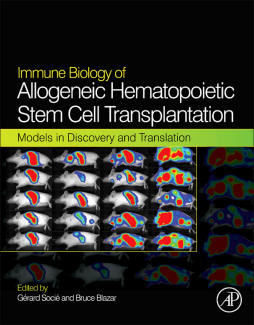
BOOK
Immune Biology of Allogeneic Hematopoietic Stem Cell Transplantation
Gerard Socie | Bruce R. Blazar
(2012)
Additional Information
Book Details
Abstract
Immune Biology of Allogeneic Hematopoietic Stem Cell Transplantation provides clinical and scientific researchers with a deep understanding of the current research in this field and the implications for translational practice. By providing an overview of the immune biology of HSCT, an explanation of immune rejection, and detail on antigens and their role in HSCT success, this book embraces biologists and clinicians who need a broad view of the deeply complex processes involved. It then moves on to discuss the immunobiology mechanisms that influence graft-versus-host disease (GVHD), graft-versus-leukemia (GVL) effect, and transplantation success. Using illustrative figures, highlighting key issues, describing recent successes and discussing unanswered questions, this book sums up the current state of HSCT to enhance the prospects for the future.
Allogeneic HSCT is a medical procedure in which a patient receives blood-forming stem cells from a genetically similar but not identical donor. This procedure is commonly performed for people with diseases of the blood, bone marrow, or certain cancers, but it remains risky with many possible complications. As such, experimental practice is reserved for preclinical animal models including the mouse and dog.
These animal models have been essential in developing transplant protocols, including preclinical testing of conditioning regimens, treatment of GVHD, and understanding the pathology of GVHD as well as the immunological mechanisms of GVHD and GVL effect. However, recent research has revealed significant species differences between humans and animal models that must be considered when relating animal model studies to clinical allogeneic HSCT scenarios.
- Brings together perspectives leading laboratories and clinical research groups to highlight advances from bench to the bedside
- Guides readers through the caveats that must be considered when drawing conclusions from studies with animal models before correlating to clinical allogeneic HSCT scenarios
- Categorizes the published advances in various aspects of immune biology of allegeneic HSCT to illustrate opportunities for clinical applications
"Socié and Blazar provide clinical and scientific researchers with 12 chapters on research on allogenic hematopoietic stem cell transplantation (HSCT) and implications for translational practice."--Reference and Research Book News, August 2013 "Bruce Blazar and Gérard Socié have put together an important book on the Immune Biology of Stem Cell Transplants. The Authors chosen for specific chapters are all recognized experts in their field. This book will be very popular among young scientists in training, as well as among experienced transplanters."--Andrea Bacigalupo, MD, Head of the Department of Hematology at Ospedale San Martino in Genoa, Italy "Self/non-self discrimination is a fundamental requirement of life. Accordingly, vertebrates are equipped with an adaptive immune system that is eminently self-referential: it is selected on self-molecules, sustained by self-molecules, and activated in the presence of self-molecules. Therefore, what might be the consequences of introducing a mature immune system in a novel "non-self" host? The consequences are many. Some are predictable and dreadful (e.g., graft-vs.-host disease), other unexpected and awe-inspiring (e.g., the graft-vs.-leukemia effect). Nonetheless, when allogeneic hematopoietic stem cell transplantation was introduced in medicine, it would have been impossible to anticipate its profound impact on our understanding of immunobiology. Gérard Socié and Bruce Blazar have taken up the gauntlet. They have assembled a dream team of experts who present a clear, comprehensive, critical and exciting picture of the current knowledge in immunobiology of allogeneic hematopoietic stem cell transplantation."--Claude Perreault, PhD, Professor and Canada Research Chair in Immunobiology Institute for Research in Immunology and Cancer Université de Montréal
